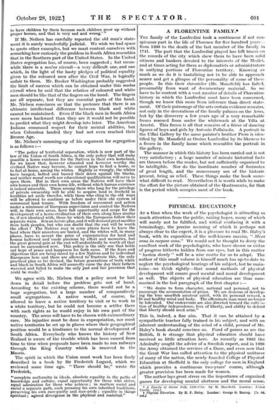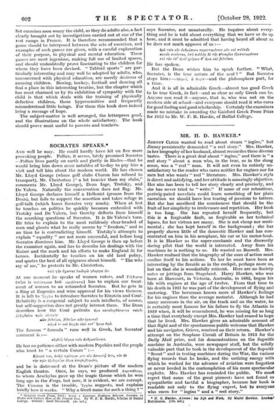PHYSICAL EDUCATION.t AT a time when the work of the
psychologist is attracting so much attention from the public, raising hopes, many of which will surely not be fulfilled, and withal confusing it with a terminology, the precise meaning of which is perhaps not always clear to the expert, it is a pleasure to read Mr. Haley's book, with its exposition of the well-known maxim, " Meta sang in corpore sano." We would not be thought to decry the excellent work of the psychologists, who have shown us vistas of progress hitherto hidden from our eyes, but in this matter " hasten slowly " will be a wise motto for us to adopt. The author of this small volume is himself much too up-to-date to neglect the psychological bearings of his subject, but he main- tains—we think rightly—that sound methods of physical development will ensure good mental and moral development as well. The objects of physical education are thus sum- marized in the last paragraph of the first chapter :— " We desire to form character, national and personal, not to encourage the accumulation of prizes. We are desirous of develop- ing the true unselfish amateur spirit, with its personal reward, a fit and healthy mind and body. The effeminate man must no longer be tolerated. Our endeavours are also directed toward the cultiva- tion of healthy independence, love of liberty, and ability to defend that liberty should need arise."
This is, indeed, a fine aim. That it can be attained by a sympathetic teacher fully trained in his subject, and with an inherent understanding of the mind of a child, perusal of Mr. Haley's book should convince us. Fond of games as are the British, it is strange that physical education should have received so little attention here. As recently as 1003 the Admiralty sought the advice of a Swedish expert, and in 1900 the Army obtained the services of a Dane, and even now that the Great War has called attention to the physical unfitness of many of the nation, the newly founded College of Physical Education at Sheffield is the only college for men in England which provides a continuous two-years' course, although greater provision has been made for women.
The author lays great stress on the importance of organized games for developing mental alertness and the moral sense.
• A Family of Decent Folk, 1200-1741. By 11. Mansfield. London: Fisher UnwIn. (15s.1 net t Physical Education. By II. P. Haley. London: George G. Harm,. Us. N. .1 Set exercises soon weary the child, as they do adults also, a fact clearly brought out by investigations carried out at one of the rest camps in France. It is therefore recommended that a game should be interposed between the sets of exercises, and examples of such games are given, with a careful explanation of their purpose, in physical and mental education. These games arc most ingenious, making full use of limited spaces, and should undoubtedly prove fascinating to the children for whom they have been devised. " Tabloid sports " are par- ticularly interesting and may well be adopted by adults, who, unconcerned with physical education, are merely desirous of amusing children. Boxing, hockey, football and dancing all find a place in this interesting treatise, but the chapter which has most charmed us by its exhibition of sympathy with the child is that which deals with the training of physically defective children, those hypersensitive and frequently misunderstood little beings. For them this book does indeed bring a message of hope.
The subject-matter is well arranged, the letterpress good, and the illustrations on the whole satisfactory. The book should prove most useful to parents and teachers.











































 Previous page
Previous page